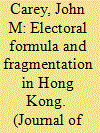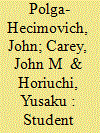| Srl | Item |
| 1 |
ID:
153320


|
|
|
|
|
| Summary/Abstract |
The directly elected representatives to Hong Kong's Legislative Council are chosen by list proportional representation (PR) using the Hare Quota and Largest Remainders (HQLR) formula. This formula rewards political alliances of small to moderate size and discourages broader unions. Hong Kong's political leaders have responded to those incentives by fragmenting their electoral alliances rather than expanding them. The level of list fragmentation observed in Hong Kong is not inherent to PR elections. Alternative PR formulas would generate incentives to form broader, more encompassing alliances. Indeed, most countries that use PR employ such formulas, and the most commonly used PR formula would generate incentives opposite to HQLR's, rewarding broader electoral alliances rather than divisions.
|
|
|
|
|
|
|
|
|
|
|
|
|
|
|
|
| 2 |
ID:
178252


|
|
|
|
|
| Summary/Abstract |
Although the value of diversity—in terms of race, ethnicity, gender, and socioeconomic status—to the U.S. military has been subject to debate, preferences for diversity at educational institutions for the military officers are rarely examined systematically. To address this, we investigate whether midshipmen at the U.S. Naval Academy favor prioritizing diversity in student admissions and faculty recruitment using conjoint analysis, a method suited for estimating attitudes on sensitive and politicized issues. The results show strong preferences in favor of applicants from disadvantaged socioeconomic backgrounds and moderate but still positive preferences for members of traditionally underrepresented racial/ethnic groups in both admissions and faculty recruitment. Midshipmen’s preferences with respect to gender are, however, less straightforward. In particular, we find a strong negative preference against gender nonbinary applicants and candidates. Our findings suggest that midshipmen’s attitudes reflect both resolved and unresolved debates that resonate throughout the armed forces.
|
|
|
|
|
|
|
|
|
|
|
|
|
|
|
|